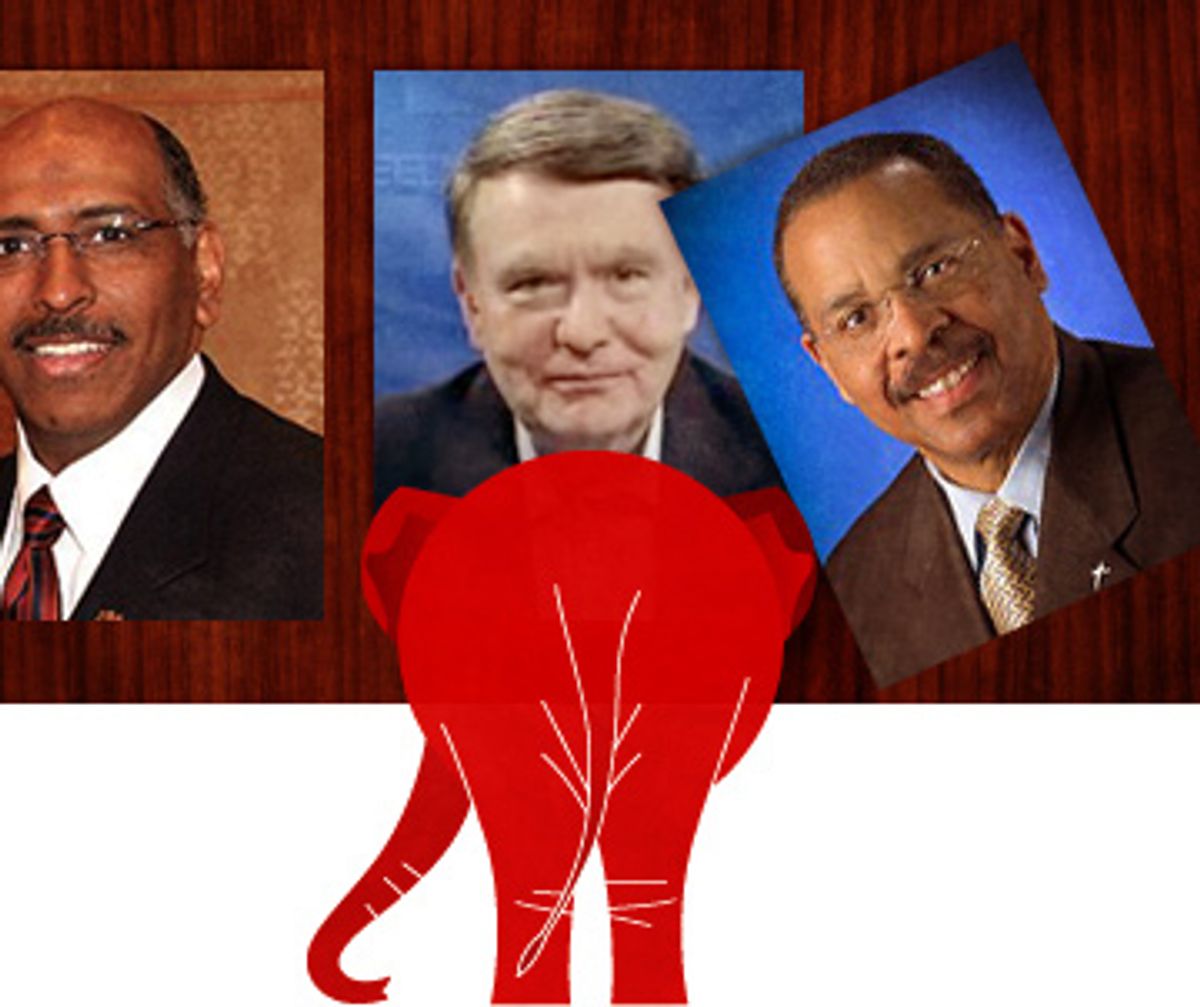Virginia Gov. Tim Kaine was just officially introduced as Barack Obama's choice to head the Democratic National Committee, but on the other side of the aisle there's still a spirited battle for the chairmanship of the Republican National Committee. The problem for the GOP? Out of the six candidates vying for the job, not one seems like the kind of person who can bring the party out of the wilderness.
Whoever wins will lead a dispirited GOP that's taken major losses in the past two elections, and will face monumental obstacles standing in the way of a quick turnaround. The nation's changing demographics favor Democrats, while the Republican Party has gradually become isolated in its power base in the South, at the expense of its support in the rest of the country.
Given the seriousness of the situation, the weak field of candidates is shocking. Love Kaine or hate him, he at least seems to have the right combination of qualifications for the job: He's from Virginia, which is newly important to the Democrats, and while he's been governor, the state has become bluer by the year. Obama won its Electoral College votes, and both Senate seats flipped, as did three of 11 House districts.
None of the potential leaders of the RNC would come in with the same kind of pedigree. True, one's from a swing state and two are from blue states, but the remainder come from red areas of the South. None hail from New England or the Mountain West, two areas where Republicans have been losing ground and badly need a comeback. Not one is Hispanic, even though that demographic group will be key to future races. (The party did once have a Hispanic chair, Florida Sen. Mel Martinez. It didn't go well -- he lasted less than a year in the job.) And only two of them have a record of significant wins. Most, in fact, have a history of losing big races.
What follows is Salon's breakdown of the field.
- Mike Duncan: The current RNC chair, Duncan took office in 2007. He was just in time to preside over an election in which Republicans lost the White House, 21 seats in the House of Representatives. a governor's chair and either seven or eight senators, depending on how the Coleman-Franken race ends up.
- Ken Blackwell: Yes, he's had some successes. He was a member of Cincinnati's City Council, then its mayor, and he was elected Ohio's state treasurer and won two terms as its secretary of state. But he wasn't actually elected mayor; at the time, the mayor was chosen by the city council from among its members. He lost a 1990 race for a seat in the House of Representatives, and in 2006 his one try at a statewide office with a higher profile ended in an embarrassing defeat, as he lost his bid to become governor by an astounding 23 percentage points. On top of that, the backing Blackwell's gotten from key social conservative leaders seems to indicate his election would mean more of the same from the party -- not a good thing for its prospects at the ballot box.
- Michael Steele: Steele's the former lieutenant governor of Maryland, but before he won that post in 2002, he hadn't held elective office. He had been chair of the state GOP for a couple years, but during his time in that job, he did little to wrest Maryland from Democratic hands. Nor was his election as lieutenant governor a major feat. He and running mate Bob Ehrlich were running to succeed an unpopular Democratic governor, and they faced a weak opponent. In 2006, Steele ran for the Senate and was beaten badly, losing by 10 percentage points.
- Saul Anuzis: One of the dark horse candidates in the race, Anuzis is the chair of Michigan's Republican Party, which he's led since 2005. He worked on some successful campaigns back in the 1980s, but his stint at the head of the Michigan GOP hasn't been much to write home about. Under his watch, Republicans lost the lower house of the state legislature, Democratic Sen. Debbie Stabenow won a second term and Sen. John McCain's attempt to make a play for the state in the presidential election failed. Plus, despite Republicans' gerrymandering of the state's congressional districts following the 2000 census, two House seats there went blue in 2008, giving Democrats the majority in the delegation.
- Katon Dawson: Dawson, who heads South Carolina's state GOP, is one candidate who actually has a history of winning. Under his leadership, Republicans have held a firm grip on the reins and even took back the state house from a one-term Democratic governor. Then again, as Blackwell quipped at a recent debate between the candidates, "We all know how difficult it is to win elections in that swing state of South Carolina."
- Chip Saltsman: Saltsman, a longshot, actually comes into the race with what's probably the most impressive record of all the candidates. During Saltsman's time as chair of the Tennessee GOP, George W. Bush won the state, Al Gore's home, out from under his opponent. Without that victory, Bush wouldn't have become president. Saltsman also engineered the surprisingly strong presidential campaign of former Arkansas Gov. Mike Huckabee. But that's a history of winning over Southerners and the kind of people who vote Huckabee in a Republican primary; the party doesn't need any help there. And his decision to send associates a CD containing the songs "Barack the Magic Negro" and "Star Spanglish Banner" for Christmas wasn't exactly evidence he's ready to start appealing to the demographics the GOP does need.



Shares